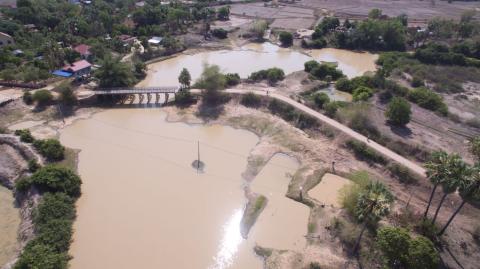
UNITAR Online Catalogue
Strengthening Climate Adaptation and Resilience

Planète
GIZ
Contexte
On behalf of the German Federal Ministry for Economic Cooperation and Development (BMZ), the Deutsche Gesellschaft für Internationale Zusammenarbeit (GIZ) GmbH is supporting the Pakistan government to improve the conditions for climate adaptation and resilience as well as climate risk management with a specific focus on vulnerable population, especially women.
The project “Strengthening Climate Adaptation and Resilience (SAR)” supports the entire planning cycle of climate change adaptation measures: from the preparation of climate risk assessments to the piloting of financing approaches and instruments. It contributes towards the National Adaptation Plan (NAP) as well as the Global Nationally Determined Contributions (NDC) Partnership, while also supporting the measures at the local level as well as upscaling through international climate finance.
In the context of the SAR project, UNITAR’s Green Development and Climate Change Unit comes to support the capacity-building component through the design, development, and implementation of this online, self-paced course on strengthening climate change adaptation and resilience. Nevertheless, the course does not provide exclusively Pakistani case studies, but also case studies from other Asian-Pacific countries and a solid core general content on climate change adaptation as one of the main pillars of the United Nations Framework Convention for Climate Change (UNFCCC).
Objectifs d'apprentissage
At the end of the course, the learner will be able to:
- Identify risks associated to climate change.
- Examine specific adaptation needs across different sectors, e.g. agriculture, infrastructure, health etc.
- Recognize the gender-specific impacts of climate change.
- Discuss the importance of policy frameworks in climate change adaptation.
- Describe the role of NAPs in fostering climate resilience.
- Explain vertical and horizontal integration in aligning national and local adaptation priorities.
- Highlight the value of inclusive and gender-responsive planning.
- Identify the role of public finance in climate adaptation.
- Discuss tools for embedding climate goals in budgeting.
- Describe the role of climate finance in supporting adaptation and achieving global climate goals.
- List the key features of international climate finance frameworks, including those under the UNFCCC.
- Differentiate between public, private, and international finance mechanisms.
- Recall the purpose and features of innovative financing instruments such as thematic bonds and blended finance.
Contenu et structure
The e-course is self-paced and adapted to the schedule of full-time working professionals. The e-course is structured in three modules, with each module including several lessons.
- Module 1: Climate Change Adaptation: the basics
Introduces fundamental concepts of climate change adaptation. - Module 2: Mainstreaming Climate Change Adaptation into Planning, Budgeting and Decision-making
Looks into the integration of adaptation to climate change considerations into governmental planning and budgeting processes. - Module 3: Financing for Climate Change Adaptation
Covers diverse financial mechanisms, tools and strategies critical for effectively funding climate change adaptation initiatives.
Méthodologie
The successful completion of the course rewards the learner with a certificate. To complete the course, the learner must complete all three modules and pass each associated quiz with a minimum grade of 70% from no more than three attempts.
Audience cible
As mentioned above, although the course was developed in the context of provision of support to the Pakistan government to improve the conditions for climate adaptation and resilience, the course is addressed to any:
- Civil servants in planning and development departments of various line ministries such as environment, agriculture, industry, finance, development, etc., at the local and national levels, and
- Stakeholders from non-governmental organizations and community groups focused on climate change adaptation and resilience.